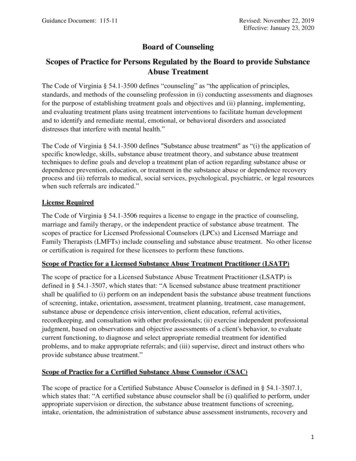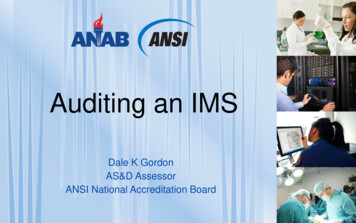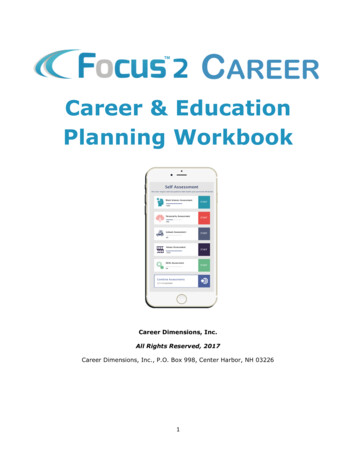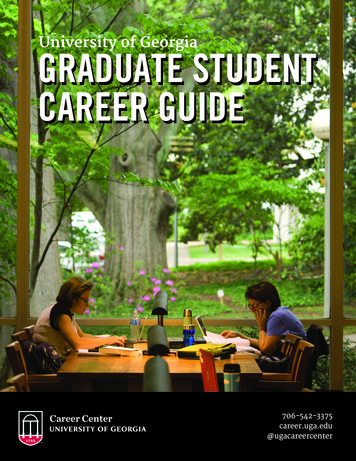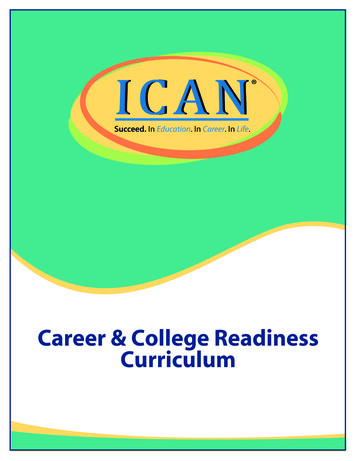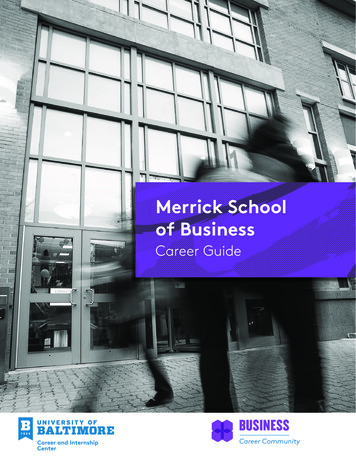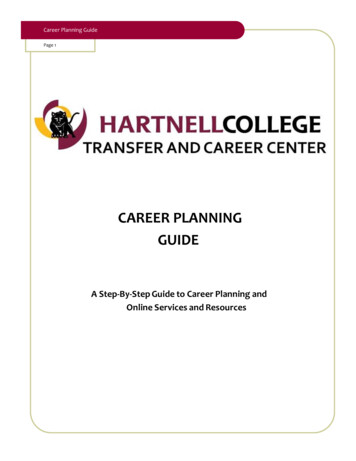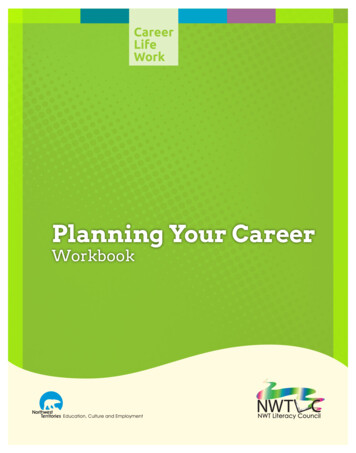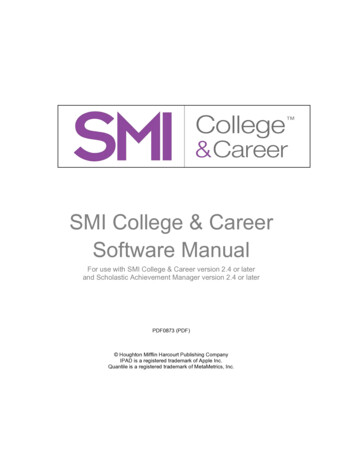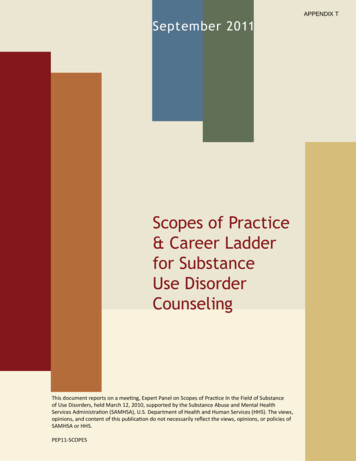
Transcription
APPENDIX TSeptember 2011Scopes of Practice& Career Ladderfor SubstanceUse DisorderCounselingThis document reports on a meeting, Expert Panel on Scopes of Practice In the Field of Substanceof Use Disorders, held March 12, 2010, supported by the Substance Abuse and Mental HealthServices Administration (SAMHSA), U.S. Department of Health and Human Services (HHS). The views,opinions, and content of this publication do not necessarily reflect the views, opinions, or policies ofSAMHSA or HHS.PEP11-SCOPES
MODEL SCOPES OF PRACTICE AND CAREER LADDER FOR SUBSTANCE USE DISORDER COUNSELORSBackground and IntroductionTreatment of substance use disorders (SUD) is recognized as a multidisciplinary practice supported bytheoretical and scientific literature. Research has demonstrated that evidence-based treatment ofsubstance use disorders can lead to significant reductions in drinking and drug taking as well as majorimprovements in physical and mental health and social functioning. However, the provision of culturallyrelevant evidence-based practices and the demonstration of significant treatment outcomes depend onan effectively trained and supported workforce. 1The Patient Protection and Affordable Care Act as well as the Mental Health Parity and Addiction EquityAct requires health plans, self-insured employers, and union-funded group health plans that offermental health and substance use disorder benefits to establish the same financial requirements andbenefit limitations that apply to general medical and surgical care. Behavioral health providers arepreparing for changes in business practices along with developing the workforce needed to respond tochanges in payment for services and anticipated increase in the demand for services. The substance usedisorder treatment field will be held to the same standards and requirements as the primary healthfield. Therefore, the substance use disorder treatment profession needs to be ready to document andcodify its services and service delivery systems.To prepare for the coming changes and increased demand for services, the Substance Abuse and MentalHealth Services Administration (SAMHSA) convened key stakeholders in March 2010 to develop a ModelScope of Practice and Career Ladder for substance use disorders treatment workers. These stakeholdersincluded representatives from the higher education, the National Association of State Alcohol/Drug AbuseDirectors (NASADAD), the State Association of Addiction Services (SAAS), the International Certificationand Reciprocity Consortium (IC&RC), NADAAC, the National Association of Addiction Professionals, andthe Addiction Technology Transfer Center (ATTC) network. The draft Model Scope of Practice andCareer Ladder were then sent out for field review and comments.This document provides a framework and a guide for States to develop their own Substance UseDisorder Scopes of Practice and Career Ladders to meet the needs of their specific jurisdiction.Please note that the recommendations in this document do not include standards for peer recoveryworkers. It was determined that stakeholders from the recovery community would be best suited todevelop these requirements unique to the peer recovery workforce.How the Scopes of Practice and Career Ladder can be usedThis Model Scope of Practice and Career Ladder document can be used and adapted by States and theirconstituencies, including the Single State Authorities (SSAs), leaders in the field, providers, professionalassociations, credentialing bodies, State consumer groups, and institutions of higher education as theydevelop scopes of practice, career ladders, credentialing criteria or course curricula. Theseconstituencies might use a model Scope of Practice to:Southern Coast Addiction Technology Transfer Center. Applying the TAP 21 to Certification Standards & Other AddictionTreatment Workforce Improvement Initiatives.11
MODEL SCOPES OF PRACTICE AND CAREER LADDER FOR SUBSTANCE USE DISORDER COUNSELORS Protect the public by setting standards;Put practice in line with higher education;Allow practitioners to be reimbursed for services (e.g., to collect 3rd party payment);Raise awareness of the profession; andInform workforce development activities.Many States already have a Scope(s) of Practice for SUD counselors, along with licensing andcredentialing requirements, while others do not. For those States without a Scope of Practice, thisdocument may provide a guide upon which to build or adapt a particular State’s needs for policy andregulation. For those States with an existing Scope of Practice, it may be a useful framework to assesswhether the current Scope is in keeping with the most up-to-date thinking in the field of substance usedisorder counseling.There are many benefits that can result from the establishment of career ladders. These benefitsinclude: Employee retention—career ladders illustrate potential for advancement, which serves as anincentive for employees to stay with organizations or within a field. Employers save on costlyturnover, recruitment, and training expenses. Using this career ladder as an example, anorganization hiring a substance use disorder technician in an entry-level position could promoteemployee professional development by encouraging additional education and training thathelps the individual move into other positions if he/she is interested in a career in the field. Performance incentives—the opportunity for advancement motivates employees to produceand perform well on the job and to acquire new knowledge and skills. Using this career ladder asan example, an organization hiring someone with a Bachelor’s degree could encourage thatemployee’s professional development in obtaining a Master’s degree combined with supervisedwork experience to move into a clinical supervision position. A career development program—the graphic representation of career ladders (such as thecharts included) provides an easily understood tool to assist career counselors and individuals incareer planning and decision-making.The Model Scope of Practice and Career Ladder provided here was developed for your use to honor thefounders of the profession by affording people an opportunity to enter the field while still developingtheir skills, knowledge base, and abilities, and advance in their career to a higher level of responsibility. 2
MODEL SCOPES OF PRACTICE AND CAREER LADDER FOR SUBSTANCE USE DISORDER COUNSELORSScopes of Practice for Substance Use Disorder CounselingThe Model Scopes of Practice presented here includes a full range of responsibility and practice, fromentry level to clinical supervision. These Scopes of Practice were developed using the definition used bythe Federation of State Medical Boards (FSMB), which defines a Scope of Practice as follows:“ definition of rules, regulations, and the boundaries within which a fully qualified practitionerwith substantial and appropriate training, knowledge, and experience may practice in a field ofmedicine or surgery or other specifically defined field. Such practice is also governed byrequirements for continuing education and professional accountability.”The Model Scopes of Practice for Substance Use Disorder Counseling presented here is based on CSAT’sTechnical Assistance Publication, Addiction Counseling Competencies: The knowledge, skills, andattitudes of professional practice, known in the field as “TAP 21” 2 and Applying the TAP 21 toCertification Standards & Other Addiction Treatment Workforce Improvement Initiatives. 3 The TAP 21has been cross-walked with the domains and functions that are required by major certification andcredentialing organizations and has been endorsed by these groups.Model Scopes of Practice for Substance Use Disorder CounselingSubstance Use Disorder (SUD) professionals work in a broad variety of disciplines but share anunderstanding of the addiction process that goes beyond the narrow confines of any specialty.Professional counseling of people with substance use disorders consists of the application of generalcounseling theories and treatment methods adopted with the express purpose of treating alcohol anddrug problems. Effective treatment can lead to a life of recovery and enhanced social, psychosocial, orbio-psychosocial functioning of individuals, couples, families, groups, organizations, and communities.Activities of a counselor within this field are based on the practice dimensions outlined in TAP 21 andinclude the following:1.2.3.4.5.6.7.8.Clinical EvaluationTreatment PlanningReferralService CoordinationCounselingClient, Family, and Community EducationDocumentationProfessional and Ethical ResponsibilitiesFor definitions of these terms, please refer to the glossary at the end of this document.Center for Substance Abuse Treatment. Technical Assistance Publication (TAP) Series 21, Addiction Counseling Competencies:The knowledge, skills, and attitudes of professional practice. Rockville, MD: Substance Abuse and Mental Health ServicesAdministration (DHHS Publication No. SMA 064171), 2006.3Southern Coast Addiction Technology transfer Center. Applying the TAP 21 to Certification Standards & Other AddictionTreatment Workforce Improvement Initiatives.23
MODEL SCOPES OF PRACTICE AND CAREER LADDER FOR SUBSTANCE USE DISORDER COUNSELORSCATEGORY 4: INDEPENDENT CLINICAL SUBSTANCE USE DISORDER COUNSELOR/SUPERVISORPractice of Independent Clinical Substance Use Disorder Counselor/Supervisor –An IndependentClinical Substance Use Disorder Treatment Counselor/Supervisor typically has a Masters or other postgraduate degree and is licensed to practice independently. The scope of practice for IndependentClinical Substance Use Disorder Counselor/Supervisor can include:1. Clinical evaluation, including screening, assessment, and diagnosis of Substance Use Disorders(SUDs) and Co-Occurring Disorders (CODs)2. Treatment Planning for SUDs and CODs, including initial, ongoing, continuity of care, discharge,and planning for relapse prevention3. Referral4. Service Coordination and case management in the areas of SUDs and CODs5. Counseling, therapy, trauma informed care, and psycho-education with individuals, families,and groups in the areas of SUDs and CODs6. Client, Family, and Community Education7. Documentation8. Professional and Ethical Responsibilities9. Clinical supervisory responsibilities for all categories of SUD CounselorsThe Independent Clinical Substance Use Disorder Counselor/Supervisor can practice under the auspiceof a licensed facility, within a primary care setting, or as an independent private practitioner. It is theresponsibility of the Independent Clinical Substance Use Disorder Counselor/Supervisor to seek outclinical supervision and peer support.CATEGORY 3: CLINICAL SUBSTANCE USE DISORDER COUNSELORPractice of Clinical Substance Use Disorder Counselor – The Clinical Substance Use Disorder TreatmentCounselor typically has a Masters or other post graduate degree. Depending on the jurisdiction, personsin this position either have not attained their license, or the license is restricted to practice only undersupervision of a Category 4 Independent Clinical Substance Use Disorder Counselor/Supervisor.Category 3 Clinical Substance Use Disorder Counselor scope of practice can include:1. Clinical evaluation, including screening, assessment, and diagnosis of Substance Use Disorders(SUDs) and Co-Occurring Disorders (CODs)2. Treatment Planning for SUDs and CODs, including initial, ongoing, continuity of care, discharge,and planning for relapse prevention3. Referral4. Service Coordination and case management in the areas of SUDs and CODs5. Counseling, therapy, trauma informed care, and psycho-education with individuals, familiesand groups in the areas of SUDs and CODs6. Client, Family, and Community Education7. Documentation8. Professional and Ethical Responsibilities9. Clinical supervisory responsibilities for categories Levels 1 and 2 as well as Substance UseDisorder Technicians.4
MODEL SCOPES OF PRACTICE AND CAREER LADDER FOR SUBSTANCE USE DISORDER COUNSELORSThe Substance Use Disorder Counselor 3 can only practice under the auspice of a licensed facility, withina primary care setting, and under clinical supervision of a Clinical Substance Use Disorder Counselor 4.CATEGORY 2: SUBSTANCE USE DISORDER COUNSELORPractice of Substance Use Disorder Counselor – The Scope of Practice for the category of those with aBachelor’s degree includes the following activities with clinical supervision of a Clinical Substance UseDisorder Counselor or other state approved supervisor:1. Clinical evaluation, including diagnostic impression or Screening, Brief Intervention, and Referralto Treatment Referral (SBIRT)2. Treatment Planning for SUDs and CODs, including initial, ongoing, continuity of care, discharge,and planning for relapse prevention3. Referral4. Service Coordination and case management for SUDs and CODs5. Counseling, therapy, trauma informed care, and psycho-education with individuals, families, andgroups6. Client, Family, and Community Education7. Documentation8. Professional and Ethical Responsibilities9. Clinical supervisory responsibilities for all categories of SUD CounselorsThe Substance Use Disorder Counselor 2 can only practice under the auspice of a licensed facility, withina primary care setting, and under the clinical supervision of Clinical Substance Use DisorderCounselor/Supervisor or Clinical Substance Abuse Counselor.CATEGORY 1: ASSOCIATE SUBSTANCE USE DISORDER COUNSELORPractice of Associate Substance Use Disorder Counselor – The Scope of Practice for the category ofthose with an Associate’s degree include the following activities with clinical supervision from a ClinicalSubstance Abuse Counselor or state approved supervisor and/or administrative supervision of aSubstance Abuse Counselor:1.2.3.4.5.6.7.8.Diagnostic impression, and Screening, Brief Intervention, Referral to Treatment (SBIRT).Monitor treatment plan/complianceReferralService Coordination and case management for SUDPsycho-educational counseling of individuals and groupsClient, Family, and Community EducationDocumentationProfessional and Ethical ResponsibilitiesThe Associate Substance Use Disorder Treatment Counselor can only practice under the auspice of alicensed facility or a primary care setting, and under the clinical and/or administrative supervision of anIndependent Clinical Substance Use Disorder Counselor/Supervisor and a Clinical Substance UseDisorder Counselor or the administrative oversight of the Substance Use Disorder Counselor.5
MODEL SCOPES OF PRACTICE AND CAREER LADDER FOR SUBSTANCE USE DISORDER COUNSELORSSUBSTANCE USE DISORDER TECHNICIANPractice of Substance Use Disorder Technician – The Scope of Practice for the category of those with ahigh school diploma or a GED include the following activities with clinical supervision from a ClinicalSubstance Abuse Counselor/Supervisor, Clinical Substance Abuse Counselor or state approvedsupervisor and/or administrative supervision of a Substance Abuse Counselor:1.2.3.4.5.6.7.8.Diagnostic impression, and Screening, Brief Intervention, Referral to Treatment (SBIRT).Monitor treatment plan/complianceReferralService Coordination and case management for SUDPsycho-educational counseling of individuals and groupsClient, Family, and Community EducationDocumentationProfessional and Ethical ResponsibilitiesThe Substance Use Disorder Technician can only practice under the auspice of a licensed facility or aprimary care setting, and under the clinical and/or administrative supervision of Clinical Substance UseDisorder Counselor/Supervisor, Clinical Substance Abuse Counselor, or the administrative oversight ofthe Substance Use Disorder Counselor. 6
MODEL SCOPES OF PRACTICE AND CAREER LADDER FOR SUBSTANCE USE DISORDER COUNSELORSCareer Ladder for the Field of Substance Use DisordersCareer ladders are occupational structures designed to encourage and reward competent employeeperformance within a field or a particular organization. Employees move up the rungs of the ladder bydemonstrating successful performance and/or obtaining education and training that prepares them forthe next level. Career ladders help employees plan for upward mobility in their careers, even if theystart in an entry-level job.The Career Ladder for the Field of Substance Use Disorders presented here provides a framework forunderstanding the education, training, and supervised work experience necessary to enter and move upin the field to positions of increased responsibility. Some staff without degrees may start in an entrylevel category and decide to purse additional education and training to increase their level ofresponsibility, while others may decide to remain in such a position because it continues to be fulfillingand meaningful to them. 7
MODEL SCOPES OF PRACTICE AND CAREER LADDER FOR SUBSTANCE USE DISORDER COUNSELORSCareer Ladder for the Field of Substance Use Disorders (SUD)Category 4 Independent Clinical Substance Use Disorder Counselor/ SupervisorEducationMaster's degree in SUD counseling or other allied mental health professional (e.g. MA in social work, mentalhealth counseling, marriage and family counseling, etc.), including at least 300 hours of SUD related topics -- ifnot received with degree, it can be obtained as advanced coursework outside the school setting.Licensing & CredentialingMost states require some kind of license and/or credential at this level. Licensing is separate from credentialingin some states, while some states link licensing to credentials. Appropriate license and/or credential and writtenexam from a nationally-recognized credentialing body based on state regulations is required.Training & Advanced Course WorkAssumes that foundational and advanced courses have been taken on substance use disorders and counseling,trauma informed care, as well as supervised practicum and/or internships; if not, at least 300 hours of specificSUD training must be obtained. OFTEN NEEDED FOR THIS LEVEL: Additional course work on clinical supervision.Supervised Work ExperiencePrior to taking the exam for this particular credential, individual must complete 4,000 hours of POST Master'slevel supervised work experience in SUDs consistent with the laws and regulations of each state, with aminimum of 2,000 hours of direct client hours.Activities Clinical evaluation, including screening, assessment, and diagnosis of Substance Use Disorders(SUDs) andCo-Occurring Disorders (CODs)Treatment planning for SUDs and CODs, including initial, ongoing, continuity of care, discharge, and planningfor relapse prevention.ReferralClient, Family, and Community EducationDocumentationService Coordination, and case management in the areas of SUDs and CODsTherapy and psycho-education with individuals, families, and groups in the areas of SUDs, CODs, and Traumainformed careProfessional and Ethical ResponsibilitiesSettingAll confidential settings, including primary care settings and private independent practiceSupervisory ResponsibilitiesClinical supervisory responsibilities for all categories of SUD CounselorsAll services are trauma informed, and all providers are prepared to practice in primary care settings.8
MODEL SCOPES OF PRACTICE AND CAREER LADDER FOR SUBSTANCE USE DISORDER COUNSELORSCareer Ladder for the Field of Substance Use Disorders (SUD)Category 3 Clinical Substance Use Disorder CounselorEducationMaster's degree in SUD counseling or other allied mental health professional (e.g., MA in social work, mentalhealth counseling, marriage and family counseling, etc.), including at least 300 hours of SUD related topics -- ifnot received with degree, it can be obtained as advanced coursework outside the school setting.Licensing & CredentialingMany states require some kind of license and/or credential at this level. Licensing is separate from credentialingin some states, while some states link licensing to credentials. Appropriate license and/or credential and writtenexam from a nationally-recognized credentialing body based on state regulations is sometimes required, andoften includes the requirement that the Level 3 clinician is supervised by a Category 4, Independent ClinicalSubstance Use Disorder Clinician/Supervisor. In other jurisdictions, this is a pre-license phase that also requiressupervision by a Category 4 Clinician/SupervisorTraining & Advanced Course WorkAssumes foundational and advanced courses have been taken on substance use disorders and counseling,trauma informed care, as well as supervised practicum and/or internships; if not, at least 300 hours of specificSUD training must be obtained.Supervised Work ExperiencePrior to taking the exam for this particular credential, individual must complete 3,000 hours of POST Master'slevel supervised work experience in SUDs consistent with the laws and regulations of each state, with aminimum of 2,000 hours of direct client hours.Activities Clinical evaluation, including screening, assessment, and diagnosis of Substance Use Disorders (SUDs) andCo-Occurring Disorders (CODs)Treatment planning for SUDs and CODs, including initial, ongoing, continuity of care, discharge, and planningfor relapse prevention.ReferralClient, Family, and Community EducationDocumentationService Coordination, and case management in the areas of SUDs and CODsTherapy and psycho-education with individuals, families, and groups in the areas of SUDs, CODs, and traumainformed careProfessional and Ethical ResponsibilitiesThe Clinical Substance Use Disorder Treatment Counselor can only practice under the auspice of a licensedfacility, and under the clinical supervision of Category 4 Independent Clinical Substance Use DisorderCounselor/Supervisor.SettingAll confidential settings, including primary care settings and private independent practiceSupervisory ResponsibilitiesClinical supervisory responsibilities for Categories 1 and 2 of SUD CounselorsAll services are trauma informed, and all providers are prepared to practice in primary care settings.9
MODEL SCOPES OF PRACTICE AND CAREER LADDER FOR SUBSTANCE USE DISORDER COUNSELORSCareer Ladder for the Field of Substance Use Disorders (SUD)Category 2 Substance Use Disorder CounselorEducationBachelor's degree in SUD counseling or other allied mental health professional (e.g., social work, mental healthcounseling, etc.), including at least 200 hours of SUD related topics -- if not received with degree, it can beobtained as advanced coursework outside the school setting.Licensing & CredentialingMost states require some kind of credential or certification at this level. Appropriate credential and writtenexam from a nationally-recognized credentialing body based on state regulations is required.Training & Advanced Course WorkAssumes foundational and higher level undergraduate courses have been taken on substance use disorders,trauma informed care, and counseling, as well as supervised practicum and/or internships; if not, at least 200hours of specific SUD training must be obtained.Supervised Work ExperiencePrior to taking the exam for this particular credential, individual must complete a minimum of 2,000 hours ofBachelor's level supervised work experience in SUDs consistent with the laws and regulations of each state, witha minimum of 600 hours of direct client work.Activities Screening, Brief Intervention and Referral (SBIRT), clinical evaluation, including diagnostic impression,screening, and assessment of SUDTreatment planning for SUDs, including initial, ongoing, continuity of care, discharge, and planning forrelapse preventionReferralsClient, Family, and Community EducationDocumentationService Coordination, and case management for SUD and CODPsycho-educational counseling of individuals, families, and groups as well as therapy with individuals andgroups and trauma informed careProfessional and Ethical ResponsibilitiesThe Substance Use Disorder Treatment Counselor can only practice under the auspice of a licensed facility andunder the clinical supervision of Category 3 or 4 Clinical Substance Use Disorder Counselor.SettingAll confidential settings, including primary care settings with supervision provided -- not including privatepractice settings.Supervisory ResponsibilitiesProvide administrative supervision of Category 1 Substance Use Counselor and Entry Level Substance UseDisorder Technician.All services are trauma informed, and all providers are prepared to practice in primary care settings.10
MODEL SCOPES OF PRACTICE AND CAREER LADDER FOR SUBSTANCE USE DISORDER COUNSELORSCareer Ladder for the Field of Substance Use Disorders (SUD)Category 1 Associate Substance Use Disorder CounselorEducationAssociate's degree in a behavioral science field with a clinical application, including at least 100 hours of SUDrelated topics -- if not received with degree, can be obtained as advanced coursework outside the school setting.Licensing & CredentialingMost states require some kind of credential at this level. Appropriate license and/or credential and written examfrom a nationally-recognized credentialing body based on state regulations is required.Training & Advanced Course WorkAssumes foundational courses have been taken on substance use disorders, trauma informed care, andcounseling as well as supervised practicum and/or internships completed. Advanced course work and trainingare usually not required at this level unless SUD specific training was not obtained through course work. If not,then 100 hours of specific SUD course work is required.Supervised Work ExperiencePrior to taking the exam for this particular credential, individual must complete a minimum of 2,000 hours ofAssociate level supervised work experience in SUDs consistent with the laws and regulations of each state, witha minimum of 600 hours of direct client work.Activities Diagnostic impression, Screening, Brief Intervention and Referral (SBIRT) of SUDMonitor treatment plan/complianceReferralsClient, Family, and Community EducationDocumentationService Coordination, and case management for SUDPsycho-educational counseling of individuals and groupsProfessional and Ethical ResponsibilitiesThe Associate Substance Use Disorder Treatment Counselor can only practice under the auspice of a licensedfacility and under the clinical and/or administrative supervision of the clinical supervision of Category 3 or 4Clinical Substance Use Disorder Counselor.SettingAll confidential settings, including primary care settings with supervision provided, and not including privatepractice settingsSupervisory ResponsibilitiesCannot provide clinical or administrative supervision of staff but can supervise community and social activities.11
MODEL SCOPES OF PRACTICE AND CAREER LADDER FOR SUBSTANCE USE DISORDER COUNSELORSCareer Ladder for the Field of Substance Use Disorders (SUD)Entry Level Substance Use Disorder TechnicianEducationGED/High School DiplomaLicensing & CredentialingMany states require some kind of credential for entry level staff. Appropriate credential and written exam froma nationally-recognized credentialing body based on state regulations.Training & Advanced Course Work150 clock hours from a jurisdiction approved education provider (related to KSA's or TAP 21) and minimum of 6clock hours of ethics training. This must be completed before beginning supervised experience.Supervised Work ExperiencePrior to taking the exam for this particular credential, individual must complete a minimum of 1,500 hours ofentry level supervised work experience in SUDs that is consistent with the laws and regulations of each state.ActivitiesOften able to implement independently: Screening of SUD and CODMonitor Treatment Plan ComplianceUnder Supervision: Psycho-educational counseling independently, and with groups for clients and familiesTreatment PlanningDocumentationThe Substance Use Disorder Technician can only practice under the auspice of a licensed facility and under theclinical and/or administrative supervision of Category 3 or 4 Independent, Clinical Category 3 Master’s, or theadministrative oversight of the Substance Use Disorder Counselor.SettingAll confidential settings, except private practice, with supervision provided.Supervisory ResponsibilitiesCannot provide clinical or administrative supervision of staff but can supervise community and social activities. 12
MODEL SCOPES OF PRACTICE AND CAREER LADDER FOR SUBSTANCE USE DISORDER COUNSELORSGlossaryAssessment: An ongoing process through which the counselor collaborates with the client and others to gatherand interpret information necessary for planning treatment and evaluating client progress.Client, Family, and Community Education: The process of providing clients, families, significant others, andcommunity groups with information on risks related to psychoactive substance use, as well as availableprevention, treatment, and recovery resources.Clinical Evaluation: The systematic approach to screening and assessment of individuals thought to have asubstance use disorder, being considered for admission to addiction-related services, or presenting in a crisissituation.Competency: Specific counselor functions comprising requisite knowledge, skills, and attitudes.Co-occurring disorder/coexisting disorder: The presence of concurrent psychiatric or medical disorders incombination with a substance use disorder.Counseling: A collaborative process that facilitates the client’s progress toward mutually determined treatmentgoals and objectives. Counseling includes methods that are sensitive to individual client characteristics and to theinfluence of significant others, as well as the client’s cultural and social context. Competence in counseling is builton an understanding of, appreciation of, and ability to appropriately use the contributions of various addictioncounseling models as they apply to modalities of care for individuals, groups, families,
The Model Scopes of Practice for Substance Use Disorder Counseling presented here is based on CSAT's Technical Assistance Publication, Addiction Counseling Competencies: The knowledge, skills, and attitudes of professional practice, known in the field as "TAP 21" 2 . and Applying the TAP 21 to

